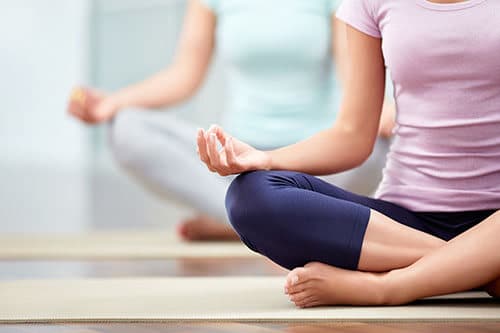Written by Drew Redd. Mina Draskovic, B.Psy., reviewed this content for accuracy.

When residents don’t have drugs or alcohol to turn to, they may struggle with stress. Yoga therapy can establish a healthy habit that can last for a lifetime. By practicing yoga on a daily or weekly basis, residents will be able to deal with stress safely and productively. Ideally, yoga will continue to be a part of a person’s sobriety for years to come.
It’s very common for residents in addiction treatment to struggle with self-esteem. Residents might feel like they are at fault for their addiction, or they might feel like they are failing if they relapse. The reality, of course, could not be further from the truth. Committing to an addiction recovery plan is a sign of strength and courage.
Through a yoga therapy program, residents can start to appreciate the strength and power of their own bodies. Mastering a new pose can be a great way to increase confidence. Sticking with a program for an extended period of time showcases internal dedication. All of this can go a long way in improving self-image.
Yoga therapy is a great tool in the fight against addiction. However, it’s also an effective way to boost overall health. Yoga is a form of physical exercise, which means that it can burn calories, help residents maintain healthy weights and stave off certain illnesses.
Yoga is a unique form of exercise because it incorporates flexibility, cardio work, and resistance training. Complete several poses back to back at a quick pace and your heart rate will increase. Hold tough poses for longer than normal, and you’re getting a strength workout. Yoga can also help improve mobility and flexibility at any age.
A big part of overcoming addiction is learning to meditate and reflect on yourself and your life. Meditation can be done in a seated position, but many residents find that challenging to start with. Yoga, however, is a fantastic way to ease into meditation.
Yoga is a form of meditation, and it allows the mind to focus while the body performs basic movements. In a yoga therapy program, residents can unwind, relax and truly think about how they feel and what their goals are for the future.
Yoga therapy is just one of the many holistic approaches to sobriety. At Ardu Recovery Center, residents can participate in a yoga therapy program as part of their comprehensive treatment plan. Other holistic and evidence-based methods to recovery available to residents include:
At Ardu Recovery Center in Provo, Utah, residents can seek help as they rise up from their current situations and embrace a better, healthier life for sobriety. Contact Ardu Recovery Center now at 801-810-1234 to learn more about how programs like yoga therapy can play a role in your recovery.

Drew Redd is the executive director of Ardu Recovery Center and is dedicated to empowering people on their journey to sobriety.